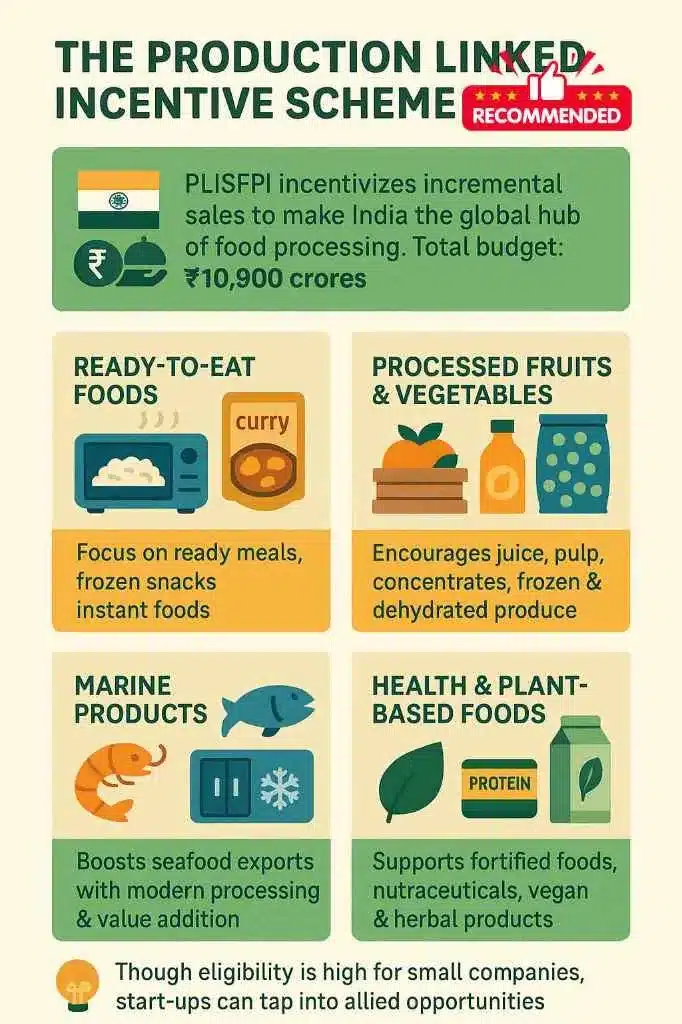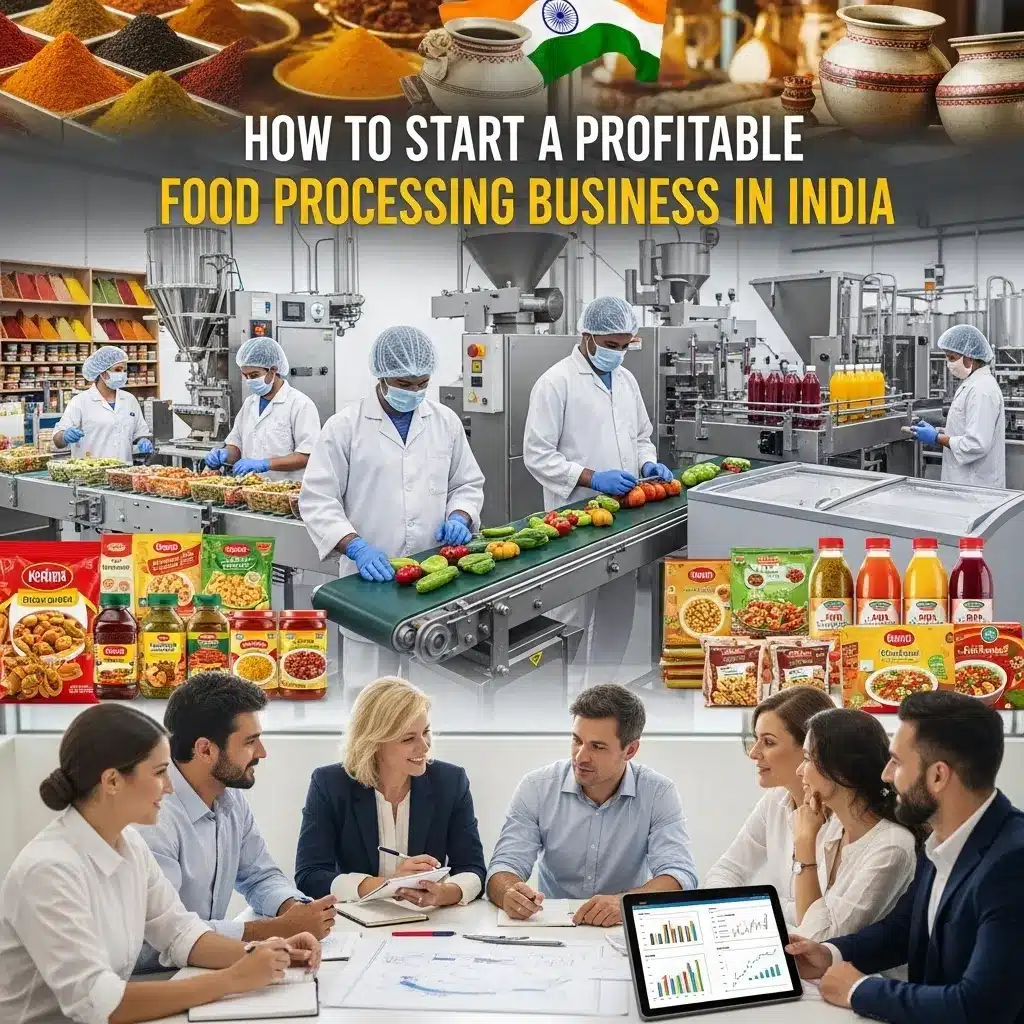The food processing industry in India is booming and is worth an estimated US$400 billion.
The industry pulls together farmers, manufacturers, and consumers into one complete ecosystem; however, very much less than 5 percent of fruits and vegetables and one-third of milk are processed, which is a waste of both post-harvest losses and immense potential.
This oddity presents an equal chance for grabbing as we stand on a start-up wave in a time of an increasing domestic market, fast-changing consumer habits, and family schemes run by governments.
In this regard, the Ministry of Food Processing Industries-MoFPI, with its well-laid-out entrepreneurial programs for the development of infrastructure, incentives, and inter-firm support, is really the way to go.
Now let’s examine how those schemes from MoFPI can be harnessed in establishing a profitable and sustainable food processing venture.
Read More: List of 33 Profitable Food Manufacturing Business Plans
Scheme Overview-MoFPI
Indeed, the schemes shall fall under three major categories:
- Infrastructure Development-Mega Foot Parks, Cold Chains and Agro-Processing Clusters.
- Incentives for Scale-Production Linked Incentives Schemes (PLISFPI).
- Support for Micro Enterprises-Formalization and credit for small food units under PMFME.
Schemes such as these at the moment give a synergistic growth environment from micro units to export-ready industries.
1. Pradhan Mantri Kisan SAMPADA Yojana-PMKSY
The budget for this scheme is ₹6,000 crore. The aim would be to create value addition and reduce wastage. The maximum grant of 35 – 50 percent, linked to credit, will be provided to the entrepreneurs for investment in processing and preservation.
Mega Food Parks
Food parks refer to industrial or commercial clusters that share common infrastructure, for instance cold storage, packaging, and testing labs. Startups will establish themselves in these parks and can then spend less on developing the facilities while focusing more on product innovation.
Integrated Cold Chain & Value Addition
The scheme will assist the entrepreneur in establishing pre-cooling, freezing, and refrigerated transport with a grant of up to ₹10 crores. Suitable for perishables such as fruits and vegetables, dairy, and seafood.
Creation/Expansion of Food Processing Capacities-CEFPPC
This will support small and medium enterprises (SMEs) for upgrading/expanding factories through subsidies of up to ₹5 crore.
Read Our Book: Click Here
Agro-Processing Clusters
APC creates mini industrial hubs geographically close to farms. They make grants available to rural entrepreneurs of up to ₹10 crores to open new up-to-date facilities for all.
Operation Greens
Initially restricted to a specific set of perishables – tomatoes, onions, and potatoes, this scheme now boasts the coverage of as many as 22 perishables, offering grants for processing and storage infrastructures set between 35 to 50 percent.
Food Safety & Quality Development
Funds food labs and training centers so that entrepreneurs may meet national and international quality standards.

2. The Production Linked Incentive Scheme (PLISFPI)
This scheme will give incentives to those incremental sales to make India the capital of food processing in the world. The scheme has been allocated a total budget of ` 10,900 crores under the following heads-
- Ready-to-eat foods
- Processed fruits & vegetables
- Marine products
- Health and plant-based foods
Although the eligibility criteria of the scheme are too high for small companies, this still holds an opportunity for start-ups to partner with PLI beneficiaries as contract manufacturers, or suppliers to access advanced technology and export networks.
Read More: Startup Guide to Building Global Food Processing Business
3. PM Formalization of Micro Food Processing Enterprises (PMFME)
The strategy will target around 2.5 million micro units and it aims to formalize micro and small food businesses as well as upgrade them by the following facilities:
- 35% subsidy (maximum exempted amount-upon ₹10 lakh, per unit)
- Support for FPOs, SHGs, and cooperatives
- One District One Product (ODOP) for regional specialities
This assists small units with modernization, adopting food safety methods, and linkages into larger value chains.
Emerging Food Processing Infrastructure
The most transformed country in terms of agriculture is India, with the implementation of more than 40 mega parks and approximately 400 cold chain projects by MoFPI. Furthermore, an additional 100 new food testing labs will ensure the quality of food commodities and enable exports.
Advantages of starting up in such clusters are shared resources, logistics-and certifications- all at a lower cost.
Import & Export Opportunities
The processed food of chocolates, cheeses, health drinks and many such items remain under import for India. All pretty easy to produce back home! And so far, it is an opportunity for startups to replace by imports, for example:
- Bean-to-bar chocolates
- Nut butters and spreads
- Premium dairy (mozzarella, Greek yogurt)
- Vegan alternatives
Export-wise, there is an increasing demand for Indian snacks, condiments, and ready meals in Asia, Africa, and the Middle East. On top of all, lower tariffs owing to trade agreements like the India-UAE CEPA make the markets, so, a startup’s playground.
For success in international markets, ensure you meet HACCP, BRC, and ISO 22000 certifications and create attractive export-grade packaging.
Top Business Opportunities for Food Startups
- Ready-to-Eat & Convenience Foods – Frozen meals, instant mixes, and healthy snacks for busy urban consumers.
- Millet & Health Foods – Cereal bars, gluten-free bakery, and millet beverages using local grains.
- Plant-Based & Vegan Alternatives – Meat substitutes, vegan cheese, and almond milk for health-conscious markets.
- Fruit, Vegetable & Beverage Processing – Juices, dehydrated fruits, and canned products with long shelf life.
- Spices, Ethnic Snacks & Dairy Value Addition – Hygienic masala mixes, papads, cheeses, and probiotic yogurts.
Inspiring Success Stories
- Amul – A cooperative model that empowered millions of farmers.
- Lijjat Papad – A women-led enterprise that scaled through quality and collaboration.
- Paper Boat – Highly packaging modernized revivals of traditional Indian drinks.
- Haldiram’s – Became a global household name originating from a regional snack brand.
Every history shows with little innovation, quality, and smart branding that everything is a small pass over the road to becoming a mega success story.
Read Our Project Report: Click Here
How Can NPCS Help You
Starting food processing business isn’t only about passion, but a whole lot of strategic planning, financial clarity, and above all, precision in developing strategies.
Niir Project Consultancy Services is a one-stop partner for the entrepreneur showing inclination towards launching or scaling food businesses in accordance with schemes of MoFPI.
For you, NPCS prepares extensive detailed Market Survey cum Techno Economic Feasibility Reports, which include market research, process flow diagrams, details of machinery, cost estimates, and financial projections.
All this approach gives you a peek into the feasibility, investors acceptability as well as confidence for bank financing.
With decades of experience across different agri and food processing industries, NPCS will not only aid in planning and implementation but also ensure that your project meets with government incentives as well as sustainability objectives.
Find the Best Idea for Yourself With our Startup Selector Tool
Conclusion: Building India’s Food Processing Future
Future of food processing in India is under change. These joined with the schemes of MoFPI shall empower entrepreneurs to develop new food brands with export potential while minimizing wastage in agriculture and generating employment.
It points that for success, products must be in sync with market demand, avail government subsidies, and ensure quality, compliance, and sustainability. And with the right planning partner like NPCS, you can confidently turn your food business dream into a thriving reality.
Top 5 FAQs
1. Who is an eligible applicant under the schemes of MoFPI?
Eligibility differs from scheme to scheme. The schemes are open to individuals, cooperatives, companies, FPOs, and SHGs who are engaged in the food processing business.
2. What are the subsidy rates under PMKSY?
The grant in favor of the entrepreneurs depends upon the type of project and its location, but it ranges anywhere between 35-50% of eligible project cost.
3. Are startups eligible to apply under PLISFPI?
The startups can leverage the PLI scheme indirectly by supplying their products or contracting manufacturing activities to bigger players which are already approved under the PLI scheme.
4. How PMFME helps microfood enterprises?
The scheme provides grants up to ₹10 lakhs with support for training, branding, and formalization, enabling small units to scale to a level of competitiveness.
5. From where could project reports be obtained for the purpose of application?
NPCS provides detailed project reports for food startups covering technical and financial aspects thus helping in project planning and funding.







